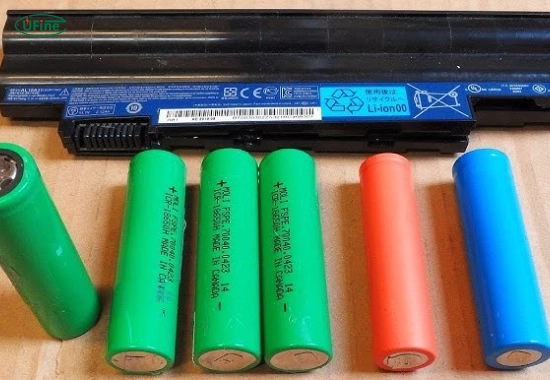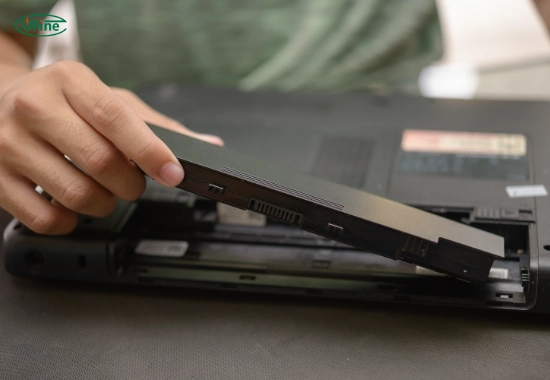
- Part 1. What is a lithium-ion battery?
- Part 2. Why are laptop batteries lithium-ion?
- Part 3. What types of lithium-ion batteries are used in laptops?
- Part 4. How long do lithium-ion laptop batteries last?
- Part 5. How to take care of your lithium-ion laptop battery
- Part 6. Can you replace a lithium-ion laptop battery?
- Part 7. Are lithium-ion laptop batteries safe?
- Part 8. What are the signs your laptop battery is failing?
- Part 9. Are there alternatives to lithium-ion laptop batteries?
- Part 10. How to check if your laptop uses a lithium-ion battery?
- Part 11. FAQs about laptop batteries lithium-ion
Modern laptops rely on lithium-ion batteries to deliver long-lasting, reliable power. So, are our laptop batteries lithium-ion? Yes, most modern laptop batteries are lithium-ion due to their lightweight design, high energy density, and ability to recharge many times without quickly losing capacity.
In this article, we’ll explore everything you need to know about lithium-ion laptop batteries, how they work, why they’re used, and how to take care of them to extend your laptop’s lifespan.
Part 1. What is a lithium-ion battery?
A lithium-ion battery (often shortened to Li-ion) is a rechargeable battery that uses lithium ions to store and release energy. These batteries are popular in portable electronics because they:
- Hold more energy in a small size
- Charge faster than older battery types
- Last longer over hundreds of charge cycles
- They are lighter, making devices more portable
Each lithium-ion battery contains cells with a positive and negative electrode separated by an electrolyte. When your laptop is used or charging, ions move between these electrodes to power the device.
Part 2. Why are laptop batteries lithium-ion?
The main reason laptop batteries are lithium-ion is that they offer the best balance between weight, performance, and cost. Here are a few reasons manufacturers prefer lithium-ion batteries:
- High energy density: More power in a smaller space
- Lightweight: Ideal for portable devices
- Low self-discharge: They hold a charge well when not in use
- Fast charging: Reduces wait time
- Long cycle life: Can be recharged many times
Older battery types, such as nickel-cadmium (NiCd) or nickel-metal hydride (NiMH), are heavier, lose charge faster, and last less long.
Part 3. What types of lithium-ion batteries are used in laptops?
Not all lithium-ion batteries are the same. Most laptops use one of these two types:
- Cylindrical lithium-ion cells: These look like small tubes. They’re durable and used in many older laptops.
- Lithium-polymer (Li-Po) cells: These are flat and flexible, allowing for slimmer laptop designs.
Li-Po batteries are becoming more common because they allow for thinner, lighter devices without sacrificing battery life.
Part 4. How long do lithium-ion laptop batteries last?
On average, a lithium-ion laptop battery lasts between 2 to 4 years, or around 300 to 500 full charge cycles. Over time, all batteries degrade, but lithium-ion holds up much better than older technologies.
Factors that affect battery lifespan include:
- Usage habits: Constant complete charging or deep discharging wear the battery faster
- Heat: High temperatures can degrade battery health
- Charge cycles: The more you charge and discharge, the quicker it wears down
Part 5. How to take care of your lithium-ion laptop battery
Want to make your battery last longer? Here are some simple tips:
- Avoid full discharges: Try to keep your battery between 20% and 80%
- Please don’t keep it plugged in all the time: Let the battery cycle occasionally
- Keep it cool: Avoid using your laptop on soft surfaces like beds or blankets
- Use battery saver mode: Most laptops have this feature to reduce power usage
- Update your system: Battery firmware updates can help optimize performance
Part 6. Can you replace a lithium-ion laptop battery?
Most lithium-ion laptop batteries can be replaced, but the process depends on the laptop model.
- Older laptops: Usually have removable batteries that pop out easily
- Newer laptops: Often have built-in batteries that require special tools and care to replace
If your battery is not charged, check with the manufacturer or a certified technician to replace it safely.
Part 7. Are lithium-ion laptop batteries safe?
Yes, lithium-ion batteries are generally safe when used correctly. However, like any battery, they can be dangerous if:
- Punctured or physically damaged
- Overcharged or short-circuited
- Exposed to high heat or open flame
Laptop manufacturers include built-in safety features, such as:
- Overcharge protection
- Temperature monitoring
- Auto shut-off circuits
Just use original chargers and avoid third-party batteries from unknown sources.
Part 8. What are the signs your laptop battery is failing?
Here are some common warning signs that your lithium-ion laptop battery may be dying:
- The battery drains quickly
- Laptop shuts down suddenly
- The battery won’t charge to 100%
- Battery status says “Replace soon” or “Service battery”
- The laptop gets hot while charging
If you notice any of these, checking your battery health using built-in tools or third-party software is a good idea.
Part 9. Are there alternatives to lithium-ion laptop batteries?
Currently, no widely adopted alternatives offer the same balance of power, size, and cost. However, researchers are working on:
- Solid-state batteries: Safer and longer-lasting, but still in development
- Graphene batteries: Promising faster charging and higher capacity
- Silicon-anode lithium batteries: A better version of current tech
But for now, lithium-ion remains the best option, and it’s used in almost every modern laptop on the market.
Part 10. How to check if your laptop uses a lithium-ion battery?
Most laptops made after 2010 use lithium-ion batteries. To check:
- Look at the battery label: It usually lists the type
- Check your laptop specs online
- Use system tools like:
- On Windows: powercfg /batteryreport
- On macOS: Hold Option and click the battery icon
If it says Li-ion or Li-Poly, then yes—your laptop uses a lithium-ion battery.
Part 11. FAQs about laptop batteries lithium-ion
Are laptop batteries lithium-ion?
Almost all modern laptops use lithium-ion or lithium-polymer batteries because they are lightweight, long-lasting, and efficient.
How long do lithium-ion laptop batteries last?
Typically, they last 2 to 4 years or 300 to 500 charge cycles, depending on usage and care.
Can I leave my laptop plugged in all the time?
While it won’t cause immediate harm, it’s best to use the battery occasionally to keep it healthy. Some laptops also have “Battery Conservation” modes.
How do I know if my battery is lithium-ion?
Check the label on the battery and the manufacturer’s website, or use built-in system tools to see the battery type.
Is it okay to use my laptop while charging?
Yes, using your laptop while charging is safe and normal. Just be sure the ventilation is good to avoid overheating.
Related Tags:
More Articles

A Complete Guide to the Best Batteries for Flashlights
Compare the best batteries for flashlights, including AA, AAA, 18650, 21700, CR123A. See which battery offers the best brightness, runtime, and reliability.
How Long Do Rechargeable AA Batteries Last?
How long do rechargeable AA batteries last? Compare NiMH and lithium AA lifespan, recharge cycles, key factors, and performance vs alkaline batteries.
How Much Current Can a 9V Battery Really Supply?
Discover how many amps a 9V battery can supply, its actual current output, discharge rate, and capacity for alkaline, lithium, and rechargeable 9V batteries.
12V STD vs 12V AGM: Meaning, Differences, and Which Is Better
Understand what STD and AGM batteries mean, their key differences, and which 12V battery fits your needs best in 2026.
Battery Reconditioning Explained: A Comprehensive Guide
Learn what battery reconditioning is, how it works, how long it takes, and when reconditioning chargers are used for lead-acid and lithium-ion batteries.




